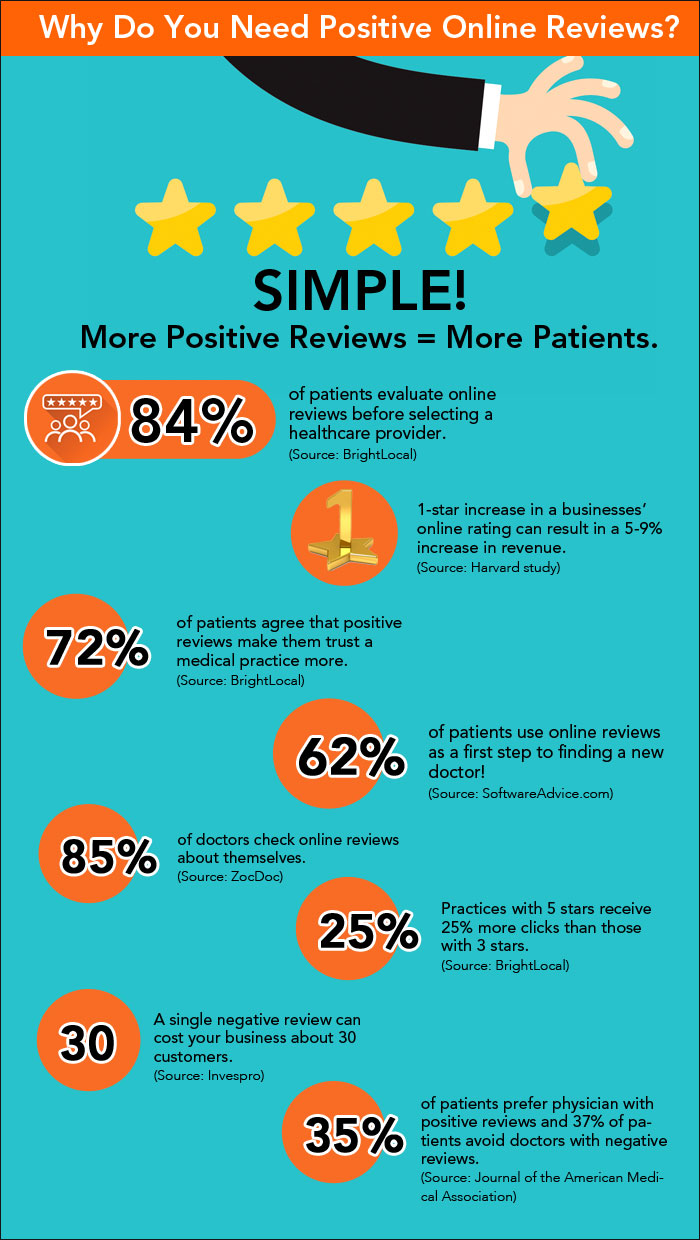How Online Reviews Influence Doctor Reputation
Posted on
Today’s healthcare providers are well-aware of the importance of online reviews. Those reviews, usually posted by strangers, can give your practice’s online reputation a huge boost, or they hurt your brand image so much that you may spend weeks fixing the damage.
The truth is, it is tremendously easy to share your opinion on the Internet, and most patients do it when they are either very happy or entirely disappointed with your services. Since the entire world can read online reviews, it is essential to keep an eye on them and act smartly if you see something damaging.
Paying attention to online reviews, in fact, is an integral part of managing your online reputation, which is a critical element in today’s digital world. There are so many moving parts in this puzzle that you must have a plan.
How do you track online reviews of your medical practice? How do you respond to them? Who drafts the responses? Do you respond to every feedback, or randomly? You must consider all of these questions carefully.
What every medical practitioner wants to achieve is a sustained five-star rating, because your online ratings and reviews are a critical factor in whether or not potential patients will choose your practice over your competition. Same with negative reviews. Having no stars, too, is as bad as having one star.
Here are some eye-opening statistics from a study done by Invespro.
- Patients are likely to spend 31 percent more on a practice with “excellent” reviews.
- 72 percent of patients say positive reviews make them trust a practice more.
- 92 percent of patients will consult a local doctor if he or she has a five-star rating.
- A single negative review can cost a practice about 30 patients.
You need at least five reviews on Google to get your stars. Acquiring 10 reviews on Google, in addition to 10 reviews on other third-party review sites, will boost your rankings. Most patients read at least four online reviews before they trust a medical practitioner.
Manage your online reputation
According to a survey by ZocDoc, 85 percent of doctors regularly check online reviews about themselves. In addition to monitoring online reviews about themselves, 36 percent of doctors track their competitors’ reviews. The survey also found that:

- Nearly 62 percent of doctors feel online reviews are “fair.”
- Almost 23 percent of doctors feel online reviews are “very fair.”
- Close to 15 percent of doctors feel online reviews are “unfair.”
When it comes to healthcare marketing, your online reputation is of utmost importance. You can have the first position in search engine results for every medical keyword, but if your online reviews show two stars in the search engine results, you will not only lose new patients but also lose the referral business that new patients would have brought.
In fact, according to another report, one negative review can cost you almost 30 new patients, and nearly 80 percent of patients will change their mind about a practice after reading a bad review. In addition, only 2 percent of patients are likely to consult a doctor with no online reviews or ratings, as compared to doctors with positive reviews who can convert 183 percent more leads. The numbers are staggering when you dig deeper and determine how critical online reviews are for a doctor’s reputation.
According to SoftwareAdvice.com, Yelp is the most used online review site, but Healthgrades is the most trusted when it comes to choosing a new healthcare provider. In addition, 62 percent of potential patients use online reviews as a first step to finding a new doctor. If 62 percent of potential patients are looking at online reviews as a first step, how crucial it is to have a strong online reputation? It is essential for the survival and growth of your medical practice!
What may surprise you is the fact that only 10 percent of patients actually post online reviews for their physicians. This is a painfully small number for such a valuable aspect of healthcare marketing.
What do your reviews say about you?
No, not about the quality of patient care you provide or the experience you deliver.
What do your reviews say about your relationship with patients?
As a medical practitioner, you have few online allies more influential than patient-written reviews. You could say patients trust online reviews – but that would not even be the half of it. Online reviews have an enormous impact on your practice and your bottom line.
Whether your reviews will be positive or negative is primarily up to you. However, if your online reviews are not what you would want them to be, it might be time to take some useful steps to connect with your loyal patients and convince them to write positive online reviews of your practice.
This is the golden question for any medical practice: Since reviews are so powerful, how can I get more patients to post encouraging reviews about my practice?

Here are eight simple but efficient ways to obtain reviews for your practice from your patients.

1. Ask loyal patients for genuine reviews: Positive reviews posted by your regular and satisfied patients are an easy and effective way to improve your practice’s online reputation. However, be sure not to ask employees, family and friends to post fake reviews.
2. Be polite: When patients are happy with your service, you can ask them to post an online review of your practice. Not all patients will be happy to write a review, but with regular follow-ups, you can increase the number of online reviews and improve your ratings.
3. Make the process easy: Your patients are more likely to post an online review if the process is easy. You can consider providing a link about where to review your practice in emails and newsletters or display the instructions at various places in your office.
4. Respond to negative comments: You will never have 100 percent positive reviews. There will be days when the staff is overly busy, or when your schedule is haywire, or your patients are having a bad day. If you see an online review that is discouraging, you must follow up quickly with the reviewer. You should contact the reviewer, apologize for the poor experience and offer to solve the issue. This will not only allow your practice to fix a problem but will also show that you are concerned about patients’ comforts.
5. Always follow up: You should always send a follow-up email to each patient after they leave your office and request them to post an online review of your practice.
6. Get listed on popular sites: Make sure your medical practice is listed on third-party review sites so that patients can easily find you and post their feedback.

7. Deliver unmatched service: The best reviews are the result of exceptional customer service. Be kind to your patients, and they will return the favor by posting positive reviews.
8. Stay active on social networks: Doctors who maintain an active presence on social media sites can gather more reviews than those who do not. This is why it is important to spend quality time on social media activities such as responding to feedback posted by your patients and sharing informative content.
Did you receive a bad review?
Receiving a negative review feels unfair. After working tirelessly to provide an excellent patient experience, you cannot let a patient badmouth your efforts just because he or she is having a bad day. This feeling can tempt you to write an angry response to a negative review. Unfortunately, a rude response will make your practice look bad and may worsen the situation.
The good news is, only patients post negative online reviews. Most of your patients do not plan to take revenge on your practice. The negative online reviews are not meant to attack you, even if it feels that way. Also, nearly 70 percent of patients who post lousy feedback hope to receive a positive response. This shows patients can criticize your practice when they have a bad experience and want you to address their issues. So, if you can improve the experience of patients who were not happy with your practice, they might modify their review to reflect the helpfulness of your employees.
So, next time you receive wrong feedback, remind yourself that negative reviews do not make you a bad practice. Instead, negative feedback is an inevitable part of running a practice.
Keep these five tips in mind when responding to negative reviews:
Do not delete the review: Maybe you do not want to bring the issue any undeserved attention. Alternatively, maybe you feel the patient’s problem is not worth addressing. The truth is, negative reviews are problems in disguise. They are your chance to engage with patients and get their feedback to help your practice grow.
Write a professional response: Do not be defensive when responding to grievances. Sarcastic replies and comments will reflect poorly on your practice. A proper response should include an apology for the patient’s experience and an offer to fix the issue and address the problem

Be prompt: Do not let destructive thoughts linger. A quick reply will show the reviewer that you are paying attention and that patient issues are a priority. You must regularly visit third-party review sites you are listed on and monitor your social mentions.
Apologize, even if you are not wrong: Regardless of what went wrong and how, always apologize to your unhappy patient. Your first message to negative reviews should be that you feel sorry for your patient’s unpleasant experience, and you would like to fix the issue and compensate for the inconvenience.
Encourage online reviews: The more positive reviews you have, the less impact a negative review will have on the overall satisfaction score. Most of your happy patients will not bother posting reviews unless you ask them to do so. On the other hand, upset patients will be posting their unpleasant experience as soon as they leave your office. So, do not leave any stone unturned to convert happy patients into brand ambassadors.
Knowing how to respond to negative online reviews is the key to patient relationships and continued growth. Negative reviews are not the worst thing in the world and, when handled correctly, they can be turned into opportunities for better growth of your practice.
How to respond to positive reviews?
Most doctors tend to obsess over an occasional negative online comment. They fume about it for days, complain to their team and look for ways to offset the damage.
The anguish is understandable. Negative comments hurt. Our doctors work so hard to take good care of us, and they are sensitive to criticism that seems unjustified.
The problem is, we spend a tremendous amount of energy on an occasional negative comment and often ignore dozens of happy reviews from our loyal patients. It may be obvious to concentrate on the bad or ugly, but ignoring the good feedback is a missed opportunity to establish and improve your online reputation.
Online reputation management is not about fighting negative comments. It is about creating your message, sharing your story and humanizing your brand.
According to a study, 78 percent of patients believe that practices care more about their patients when they respond to online reviews. When doctors respond to positive reviews, they tell patients that they are interested in creating exceptional experiences.
So, how to respond to positive reviews?
1. Give thanks: Your patient took the time to write an encouraging review of your practice. Take a few minutes to show your appreciation. It might be tempting to send a gift or offer a discount, but do not do it. If you would like to add a special touch, send a handwritten thank-you note. In today’s digital word of email inboxes, a handwritten note is always noticed and appreciated.
2. Get personal: If possible, add a personal touch to each response. Adding a personal touch will make your response more meaningful and sincere.
3. Compliment your reviewer: Your patients are a reflection of your practice. Compliment them often. A personal thank-you note may go a long way.
4. Add a touch of marketing: Your response is not just for the reviewer. A lot of potential patients will also read it. Take the opportunity to brag about your practice and unique services.
5. Share the feedback: Recognize your team and share the glorious feedback. Always remember that a positive review is vital for your online reputation, but it can also do wonders for your team’s morale. Sharing positive reviews with your team is an excellent way to start the day right.
Online reviews are your best friend
Let’s face it: Online reviews are just a part of running a practice in today’s world. Approach them without fear and apprehension.
Treat your positive reviewers to the same amount of effort and attention you would give a negative reviewer. Help your positive reviewers see how important they are to you. Positive reviews are a real treasure in your doctor reputation toolbox.
Ensuring your online presence is a healthy representation of your practice should be a top priority for every healthcare provider.
If you want to know more about attracting more stellar reviews and building a strong online presence, give Practice Builders a call, or look at our doctor reputation services page for more info on what we offer.

 Why Good communication Matters in Healthcare
Why Good communication Matters in Healthcare De-Escalation Tips for Handling Aggressive Patient..
De-Escalation Tips for Handling Aggressive Patient.. Reaching The Right Audience Through Target Marketi..
Reaching The Right Audience Through Target Marketi..